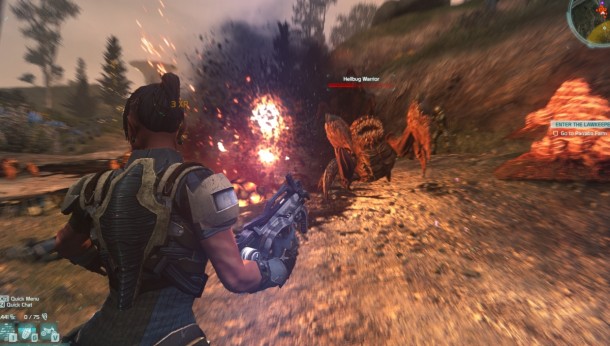Our Verdict
A competent MMO shooter marred by a lack of polish, whose TV tie-in ambitions only seem set to cause problems.
PC Gamer's got your back
Around a dozen hours into my time with Defiance, I realised that I was having fun. Not the kind of fun that warrants an unreserved recommendation, but I had acclimated to the vagaries of Trion's sci-fi MMO shooter in such a way that I was getting something out of it. My early impressions, however, were not good. When I started playing, I scooted around on a quadbike and blasted mutants and noticed all of the game's faults.
"Nothing really broke, but nothing ever felt fully finished, either."
I noticed the empty feeling of its combat, which suffers from the weightlessness that dogs many open-world third person games. I noticed the low draw distance and brutally truncated level of detail, which buries Defiance's take on post-apocalyptic wilderness in beige fog. I noticed how nothing really broke, but nothing ever felt fully finished, either: enemies slid through walls, other players' vehicles hung in mid air, cutscenes underwhelmed.
After a time, I got used to it. I moved on to a part of the game that was a marginally lighter shade of green, and I blasted raiders with weapons that - if not impactful - did the job faster. I learned the rhythm of dodge-rolling and crouching to reload my sub-machine gun, whose ability to fart out a clip in under a second turned Defiance into a floaty, three-dimensional game of whack-a-mole. Sometimes I'd toss a stun grenade back over my head and mop up a few foes at once, or plonk down a timed explosive in the middle of a skittering group of alien bugs and watch them pop. I'd level up and invest points and collect three different kinds of currency and spend them on lock boxes, which would grant me another set of randomly-generated weapons. I'd pick one and try it out and change the rhythm of combat for a while. I started having a pretty okay time, all things considered.
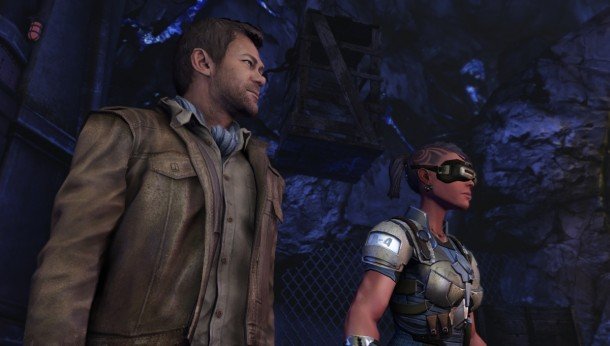
Trion have succeeded in making an MMO that feels like a shooter first and foremost, and that's something. The game's primary influence is Borderlands. While the majority of the early decisions you make about your character are cosmetic, you pick one signature ability that defines you. These powers - cloaking, a speed boost, a weapon buff, and a decoy - have a hefty cooldown and therefore work just like the equivalent class powers in Gearbox's FPS. Most of your time will be spent shooting from the hip, but every now and then you'll use your special power to clear a room.
As you gain experience you earn points to spend on perks - bonus damage while above or behind an enemy, shield regeneration on a critical hit, and so on. These buffs are slight and feel inconsequential: your choices are better expressed through weapon selection. You can equip two at any given time, and repeated use of a particular type improves your ability with it. Guns are randomly generated. This chiefly results in barely-perceptible variations in accuracy or recoil, but sometimes you'll find a weapon with a random chance to dissolve an enemy in acid or set them on fire. Again, a little like Borderlands: but without that game's humour, and without its capacity for real surprise.
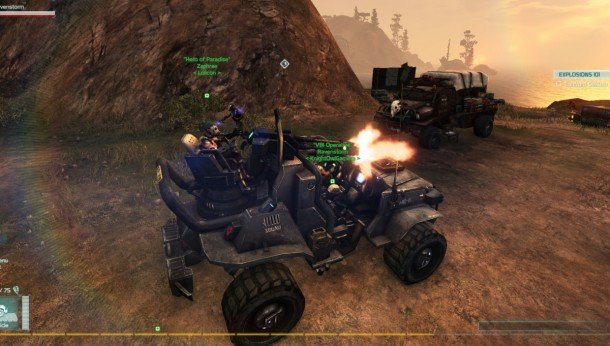
The presence of other players is chiefly felt in co-op challenges, which are instanced and designed for four people. They're not particularly tough, and the majority of people I played with were content to burn through them in silence. It's worth noting, though, that the game's visuals markedly improve in these enclosed areas.
"The majority of people I played with were content to burn through in silence."
There's also competitive team deathmatch on medium-sized maps and a 32-player capture point mode, Shadow War, that takes place in cordoned-off parts of the gameworld. Power level is equalised between players for competitive play, but you take in the equipment and abilities you otherwise possess: a balancing challenge that the game doesn't seem particularly interested in solving. A mixture of bunny-hopping, cloaking and judicious grenade launcher use saw me to the top of most leaderboards.
Out in the open world, players congregate around 'arkfalls'. These are semi-random events that work similarly to Rift's, er, rifts. Players mob together to wipe out waves of bugs and whittle down the healthbar of a huge chunk of space debris in return for resources that are spent on more lockboxes.
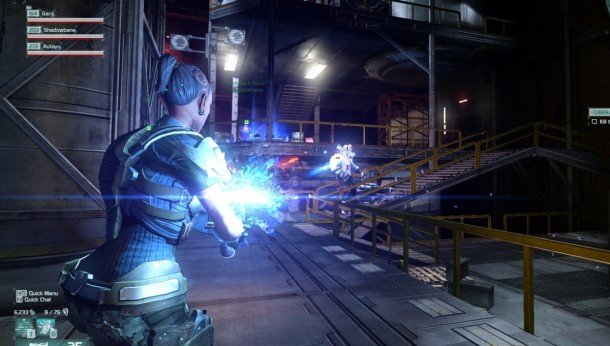
My issue with Defiance is that its ability to marry a bunch of divergent types of game - the MMO, the action RPG, the competitive shooter - doesn't change the fact that all of these have been done better elsewhere. It feels lifeless, a sense compounded by the absence of friendly towns or things to do beyond blasting bandits and filling your own coffers. Without a subscription fee, there's less pressure to provide a bottomless well of content: but nonetheless, it doesn't seem unreasonable to hope for a little more substance.
"It's aimed at people who can use words like 'cross-media experience' without giggling."
The release of the game has been timed to coincide with the launch of a TV show on the SyFy network. It's intended that you'll play one and watch the other: Defiance as a whole is billed as a cross-media experience, and therefore is aimed at people who can use words like 'cross-media experience' without giggling. At the very least, the producers hope that you will keep playing - and paying - to follow the plot of the game and show alongside one another.
The setup is this: fifty years from now, the Earth has been warred over and partially terraformed by a coalition of alien species fleeing the destruction of their own star system. The conflict with humanity lead to the destruction of the alien fleet, which now forms a ring of debris around the planet. Every now and then a chunk of priceless interstellar material will come crashing down to be fought over by scavengers and mercenaries called 'ark hunters'. In the series, a pair of ark hunters start a new life in what remains of St. Louis: in the game, the player creates an ark hunter exploring the wilderness north of San Francisco.
There's a small amount of interaction between your character and the show's leads in the game's opening hours, but the consequences of your actions are dealt with on-screen within the first ten minutes of the pilot episode. The show, for what it's worth, is campy and derivative when it's not outright awful. The plot of the game does not fare much better.
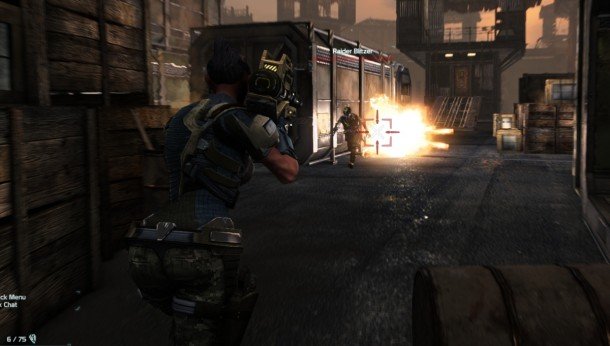
It's hard to see what Defiance gains from being attached to a TV series. The promise that events in the show could affect events in the game and vice versa is nebulous at best and flatly unbelievable at worst. Given the simple difference in how the two are made, the exchange is likely to be one-way: and the smart money is on gamers getting short shrift. There is an off-chance that it'll come together for the duration of the first season of the show, but after that it's anyone's guess.
"The world of Defiance is drab in the way that TV science fiction has a tendency to be drab."
It's not simply a logistical issue. The world of Defiance is drab in the way that TV science fiction has a tendency to be drab. The game feels like it has been shot - appropriately enough, I suppose - on a California back-lot, and its character design is limited to what can be assembled out of prop room cast-offs, face paint, and the odd prosthetic nose. At the very least you'd think having a TV series' resources on-hand would raise the game's writing and acting above par, but Defiance features some of the worst dialogue I've ever encountered in a game.
I'd like to take this opportunity to quote, verbatim, a conversation between a senior male scientist and a female mercenary that happens about six hours into the story.
"Just stop," says the scientist. "Your anger isn't intimidating. Frankly, it's sexy!"
He turns to the player.
"Where did you find this saucy vixen? "
There's a pause: presumably as everyone involved takes a moment to vomit helplessly into their cupped hands. The mercenary frowns.
"I am going to punch you in the face", she responds.
In the absence of a sense of life beyond my own character, or of a world that responds to my actions, it is unlikely that scripted drama of this calibre will keep me playing.
Despite its basic competence, Defiance seems destined for rapid depopulation: there's just not enough here, and what is here doesn't sustain long-term interest. Trion are calling this a 'soft launch', and as with any nascent MMO there's a chance that the next few months could see a significant improvement. Even if that does happen, it'll be representative of the problem with the whole: a project this ambitious needed to make a much more striking first impression. In being turned out in time for the TV show, Defiance the game risks playing its hand too late.
A competent MMO shooter marred by a lack of polish, whose TV tie-in ambitions only seem set to cause problems.
Joining in 2011, Chris made his start with PC Gamer turning beautiful trees into magazines, first as a writer and later as deputy editor. Once PCG's reluctant MMO champion , his discovery of Dota 2 in 2012 led him to much darker, stranger places. In 2015, Chris became the editor of PC Gamer Pro, overseeing our online coverage of competitive gaming and esports. He left in 2017, and can be now found making games and recording the Crate & Crowbar podcast.
